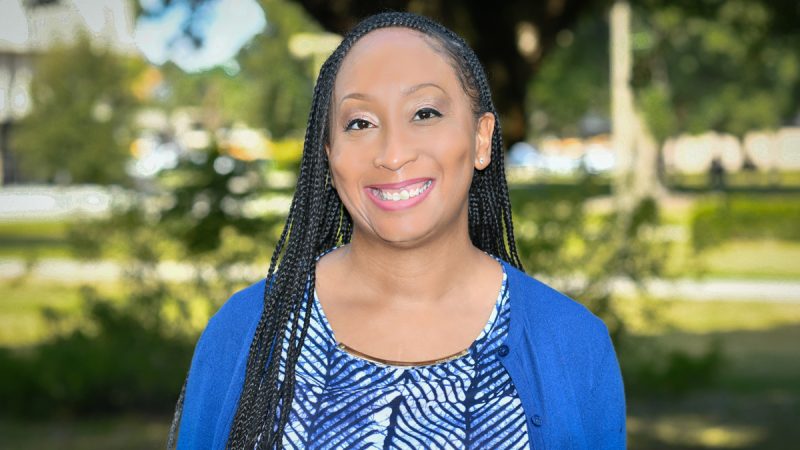Polk State Disability Services Coordinator understands student struggles firsthand and is here to help

Dionne Formey truly understands what students are experiencing during these unusual times. As Polk State College’s Disability Services Coordinator, she is tasked with ensuring that reasonable and appropriate accommodations are in place for qualified students with physical and/or mental disabilities. Her goal is to make sure that students have the materials and conditions to succeed academically. She also uses her position to check in on students’ mental health and well-being.
Formey has an educational background in psychology and behavioral analysis and work experience as a social worker. She is also in the last few months of a Rehabilitation Counseling program at Fort Valley State University where she will graduate with a Master of Science degree in May 2021. As a single parent helping her child complete schooling from home while working a demanding, full-time job with the College, Formey is experiencing many of the same challenges that College students and their families are facing.
“Sometimes students see working professionals and think of them only as being one way. They think that everything has to go right,” Formey said. “I tell them that I dropped out of school to have a family, and I had to take time off from school to address a serious illness. But I finished and I continue to move forward.”
That ability to relate to what students are feeling and experiencing provides Formey with a very powerful perspective.
She says that before the COVID-19 public health emergency, most students that she worked with had academic-related stress. As the one-year anniversary of the start of the pandemic approaches, Formey says that most students that she works with now are struggling with anxiety-related issues and depressive moods. Many are dealing with the loss of income, physical and emotional fatigue, and bereavement.
Before the COVID-19 public health emergency, students were introduced to Formey in their classes and could visit with her on campus. With most courses now online or in hybrid formats, Formey relies heavily on referrals from professors and Student Services employees.
“It doesn’t make you weak to have to ask for help. We want you to achieve your optimal level of academic, mental, physical, and financial achievement. No matter how hard things get, there is always someone at the College who is willing to help.”
Dionne Formey
Disability Services Coordinator
“Students are encouraged by professors to call and email me if they are identified as needing special accommodations for a disability or they seem to be struggling with issues beyond academics. I take the opportunity to talk with them about how they are doing overall,” Formey explained.
Formey offers counseling sessions and works closely with students to connect them with additional resources including housing, food, and healthcare, as appropriate. She refers students to the BayCare Student Assistance Program, which provides free, confidential, 24-hour counseling services, and works with community partners like United Way of Central Florida and others to ensure that students and their families have access to critical supportive services.
Formey says that the majority of students who are reaching out to her now have never needed mental health assistance before or have never had to seek out social services for support.
“It doesn’t make you weak to have to ask for help,” she assured. “We want you to achieve your optimal level of academic, mental, physical, and financial achievement. No matter how hard things get, there is always someone at the College who is willing to help.”
Formey has a policy of making herself always available to students – something that has been particularly important during these unusual times. She encourages students to call her at any time if they need to talk.
Additionally, Formey uses several techniques to help students understand why they are feeling anxiety or stress and how to move beyond those feelings. She asks students to participate in journaling in which they write down their thoughts. She then reviews journal entries with them to look for patterns of positive or negative behaviors and signs of growth and progress. She encourages them to exercise and practice breathing and mindfulness to help with focus. She also encourages active listening so that individuals are truly understanding communications.
Formey is committed to doing everything she can to ensure that students are able to succeed. To encourage students she often cites Malcolm X and states, “Education is the passport to the future, for tomorrow belongs to those who prepare for it today.”
Students may contact Formey at dformey@polk.edu or 863.292.3759 for more information and assistance with counseling and disability services. A list of resources is also available here: www.polk.edu/news/polk-state-provides-counseling-services-and-mental-health-resources.

